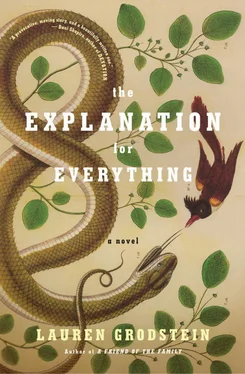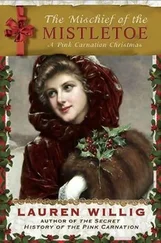Anyway, Andy, I hope you can forgive me my absence. I would have reached out to you before I died, but as you can probably tell, I’ve been a bit feverish. And I was afraid, perhaps, that you would judge me unkindly.
My hope for you is that you have come to a happy place in your life. (How old are you now, anyway, kid? Could you be forty?) And of course you have an awful lot left of it. Enjoy it all, my friend, and know that I always thought of you with much affection.
And that was all.
Andy put down the pages. There was nothing to do about the cold pained surprise throbbing in him—no, he had not known that Rosenblum was dead, and had enjoyed (perhaps too much) the elaborate imaginings of surprising the old man at home, reconnecting, drawing him out of his solitude.
But the man was dead. He probably should have figured it out, but he was never quite the student Rosenblum wanted him to be. He splashed more water on his face, so that if he was crying he could not really tell. Then he took a cigar—his first one in a while—and went outside in the drizzly cold to light it, sheltering his Zippo with his hand. He tried to enjoy the lashing of the cold air as he stood on his porch and looked toward where the sun would soon rise. Across the street sat a prefab house with aluminum siding turning greenish, neighbors he rarely saw. But they were alive. Weren’t they alive? And would it matter to him if they weren’t? Did it matter that Rosenblum was gone if he refused to believe he was gone? Could he still be alive in Andy’s mind?
Louisa’s ghost just behind him. No, dummy, that’s not how death works.
Andy walked down the street, the cigar smoke trailing behind him like a dog, ignoring as best he could the drizzle and Louisa’s ghost, trying to conjure up Rosenblum’s ghost instead, so he could yell at him. It wasn’t fair of him to make Andy feel, once again, like an ignorant rube. He drew in on his cigar. Rosenblum was the one who taught him to smoke cigars, in the rose garden behind the math building, where smoking was politely ignored. Rosenblum cutting and lighting the cigar for skinny Andy, Ohio’s prodigal son. Rosenblum was undeniably fat, his large head rimmed by a halo of wiry hair, brown eyes that didn’t twinkle so much as glitter, a sharp nose, lascivious lips. Porcine Hardy to Andy’s nervous Laurel. “Jesus, Andy, try to look like you’re enjoying it.”
Andy coughed, felt like a fool, tried to look like he was enjoying it. After a while, he did enjoy it, and he and Rosenblum would meet frequently behind the math building whenever the weather was nice, and Rosenblum would expound, and Andy would smoke happily.
Now, Andy walked down Stanwick Street with his cheap cigar between his thumb and his forefinger, even though the walk couldn’t possibly warm him up. He surveyed the neighbors’ houses, Roberta Hayes who still had Saint Patrick’s Day leprechauns on her chicken coops. Sheila’s Ford in her driveway. Which was odd, because whenever it was rainy Sheila parked in her garage.
The Ford’s windows were fogged. Why would the windows fog? He crossed the lawn toward her driveway, in a hurry. He wiped a clear space on her car window with the sleeve of his sweatshirt.
She was in the driver’s seat, eyes closed, mouth halfway open and apparently mumbling something in her sleep. “Sheila,” he said out loud; her lips kept moving but her eyes stayed closed.
“Sheila!” He banged on her window, and she stopped moving her lips. Her head was tilted back and a thin line of drool leaked from the corner of her mouth. She rubbed her nose, turned her head the other way. She wasn’t wearing a coat. Where had she been at four in the morning with no coat? Why was she sleeping in the car? Should he wake her up? He almost certainly should wake her up. Was Jeremy okay?
Andy took a step backward. It was Sunday morning. Jeremy was at his dad’s. And if it was odd that she should be sleeping in her car—well, it was odd too to be strolling in nothing but a worn-out sweatshirt in the frigid dawn. Smoking a cigar. Who was he to judge Sheila?
Still—she looked vulnerable there. She was certainly vulnerable there. But if he knocked on the window again, woke her up, she might have to tell him things she didn’t want him to know. He’d leave her be. He stepped backward, away from her car, then hurried home, dropping his cigar in a frosty puddle as he ran.
The next day he took the girls—quiescent, agreeable—to school and then headed to the office. The semester was in full strut now, after spring break, and he had his midterm grades to take care of, and a meeting of the student advisory committee, and the accreditation committee, and although the NSF grant wasn’t due until next week he still had to figure out how to make his numbers work. He still wanted a NanoDrop spectrophotometer and perhaps a new ultracentrifuge, although the truth was if he had this new equipment he would have to keep performing experiments, and for some reason the thought of this, of dosing more mice and then dissecting them in order to prove his ever more unprovable theory that alcoholics were resistant to behavioral changes—in order to prove that Oliver McGee should stay in jail—it suddenly seemed more than just pointless. It seemed cruel.
Should he have knocked on Sheila’s window? Should he have left her there? Yesterday afternoon, on the pretext of checking in about the third-grade science fair, he had knocked on her door. Her hair was damp, and she looked tired but clean. Her house smelled like chicken nuggets. She told him he looked tired, and he agreed that he was. He left then, in a hurry.
That evening Rachel had made them lunches—tuna salad with curry powder packed into Tupperware in the fridge. Andy took his now to the picnic table by the faculty parking lot even though it wasn’t quite warm enough to start eating outside. The wind tousled his hair as he walked across the old weedy campus, and he wondered what he would do with himself if he didn’t teach here anymore, if he didn’t get tenure. He was still, after all, in the first half of his life. He was still in possession of a thick head of hair. His tie blew eastward. Andy sat down at the picnic table and considered what, exactly, he loved about what he did. Mostly at this point it was the steadiness of it.
If he left here he could take his daughters to Ohio, his own mother and the Mother of Presidents. Or he could convince his mother to move with him somewhere else, Hawaii, California. He could have that beach house in California. He could find a job doing anything else. He didn’t have to stay here, under the gray windy skies of the New Jersey Pine Barrens. He didn’t have to keep dissecting mice. He wasn’t sure anymore what he wanted to prove.
As Rosenblum said, he was still a young man.
“Mister. Hey, Mister.”
But it was nothing, the wind.
That first night as newlyweds in their first apartment together in Philadelphia, seventeen years ago, a lifetime, Louisa asked him why his mother hadn’t remarried.
“Really? You want to talk about my mother?” They were in bed, where they’d been all evening, eating fried chicken from a bucket, entirely naked and planning their futures.
“She’s a nice woman, and she’s good-looking,” Lou said, picking a crispy bit of skin off a drumstick. Andy had never eaten in bed before he met Louisa, never spent entire hours naked (nudity was for showers and medical procedures), never kissed anyone after waking up and before brushing his teeth. Her work hours were odd, staggered—she’d have twelve-hour shifts for three days straight and then a week off—and Andy found himself unable to write his dissertation when she was home (oh, to be naked, eating fried chicken off dirty sheets, Louisa’s tan back) and unable to work when she was away, either—he could only sleep or count the hours until she came home. Now he pressed his thigh against her calf, picked up her arm with the scar along the cephalic vein and kissed her there.
Читать дальше












